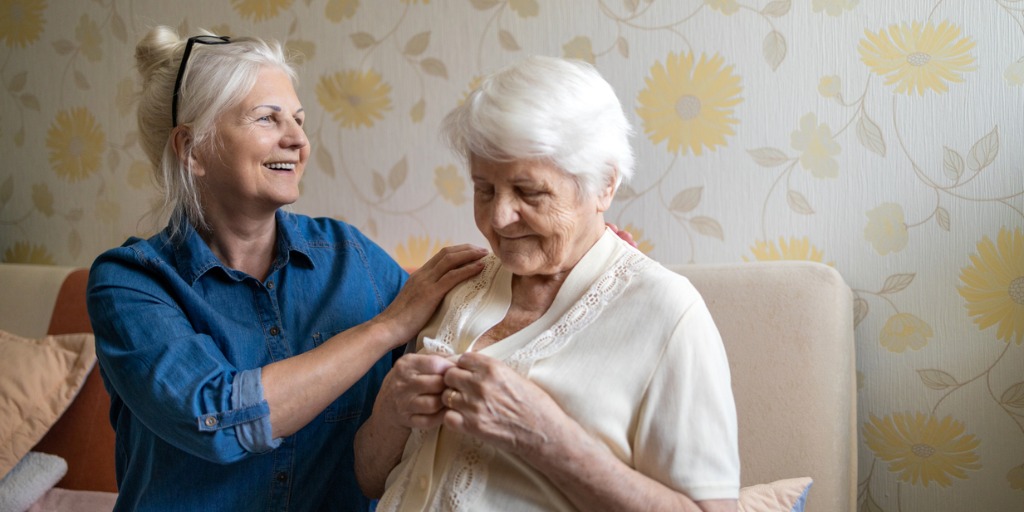National Alzheimer’s Disease Awareness Month and a discussion with the BrightFocus Foundation

November is both National Alzheimer’s Disease Awareness Month and National Family Caregiver Month, a time to show support for the millions of people who are living with Alzheimer’s disease and to honor the invaluable family members and friends serving as Alzheimer’s caregivers. Stacy Pagos Haller, President and CEO of the BrightFocus Foundation, talked to us about why recognizing Alzheimer’s disease and family caregivers during this time is so important, how the BrightFocus Foundation helps build community, and why clinical research is a critical piece of the search for potential Alzheimer’s treatments.
November is both National Alzheimer’s Disease Awareness Month and National Family Caregiver Month. Why is recognizing Alzheimer’s during this time so important? What role do family caregivers play for Alzheimer’s patients?
This is an important time of year to call greater attention to Alzheimer’s. Holidays are often when extended families are together for the first time in a while, and cognitive changes may be noticed that could either be “normal aging” or early signs of dementia.
A better public understanding of Alzheimer’s can help families strike the right balance between continuing meaningful holiday traditions and adjusting to help a family member.
A large majority of Alzheimer’s caregiving is provided in-home by family members. Caregiving can be a source of meaning and purpose and a sense of selflessness, but it can also exact a steep toll. Caregivers experience great stress and fatigue, putting their own health at risk. Family caregivers are in a strong position to communicate with health care providers about the patient’s daily life and challenges. It is crucial that we fully support our family caregivers.
How does the BrightFocus Foundation help build community during these awareness months, and all year round?
The primary way we build community is by being a trusted resource for timely, accessible information on Alzheimer’s, rooted in the latest science supported by BrightFocus and others. Our public awareness mission aims to better inform and empower those impacted by Alzheimer’s.
We are active on all major digital platforms, both communicating the latest news and helpful tips on Alzheimer’s, and also increasing engagement through sharing of personal stories, videos, and images that provide a first-person perspective on living with the disease.
Through our national leadership role with the Dementia Friendly America campaign, we are helping to strengthen the ability of persons living with dementia to remain safe and active in their own communities.
What kind of resources and support does BrightFocus Foundation offer for Alzheimer’s disease patients, caregivers, and families?
The most recent addition to our suite of resources is Brain Info Live, a free interactive video program combining entertainment and expert advice on brain health. Along with Brain Info Live, on our website, you can find expert articles to help better understand and manage brain health, news on the latest scientific developments, and an array of infographics and videos to convey clear, science-based information on Alzheimer’s and related dementias.
Why is clinical research so important in the Alzheimer’s space? What role do caregivers play in the research process?
Research equals hope. To defeat Alzheimer’s, we need rigorous, inclusive clinical trials to test, in a real-world setting, the safety and efficacy of possible treatments. Without a robust system of clinical trials, promising treatments could wither on the vine. Broadening the locations of trial sites can help increase participation and diversity in clinical trials.
Care partners are often integral to successfully completing a clinical trial, particularly for Alzheimer’s disease, as they can help communicate with those leading trials as well as provide transportation and other aid. They may also be eligible to participate in clinical trials as a spouse or in other ways.
What excites you most about upcoming Alzheimer’s disease clinical trials?
Alzheimer’s is one of science’s most complex and toughest diseases, but we are living in a time of great discovery and progress for Alzheimer’s research. There are currently 28 potential treatments in the pivotal, late-stage Phase III of the clinical trial process with many other possibilities at earlier stages.
Well-established research on “lifestyle” interventions – such as healthy diet, sleep, and exercise – demonstrates their role in slowing Alzheimer’s, and gives us actions we can take today while we work toward new treatments to defeat this horrible disease.
If you’re interested in looking for clinical trials for Alzheimer’s or other dementias, start your search by clicking the button below.
Topics: For Patients

